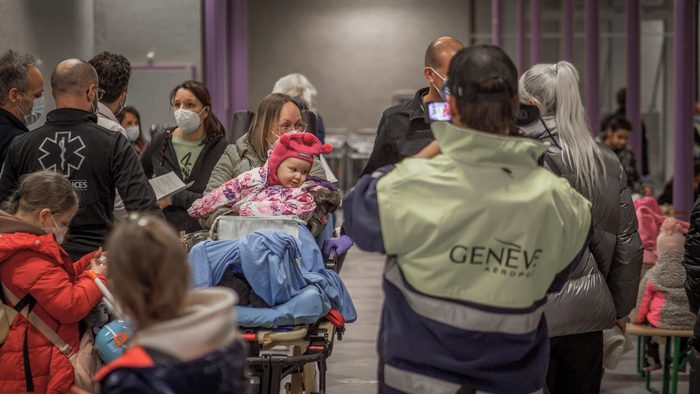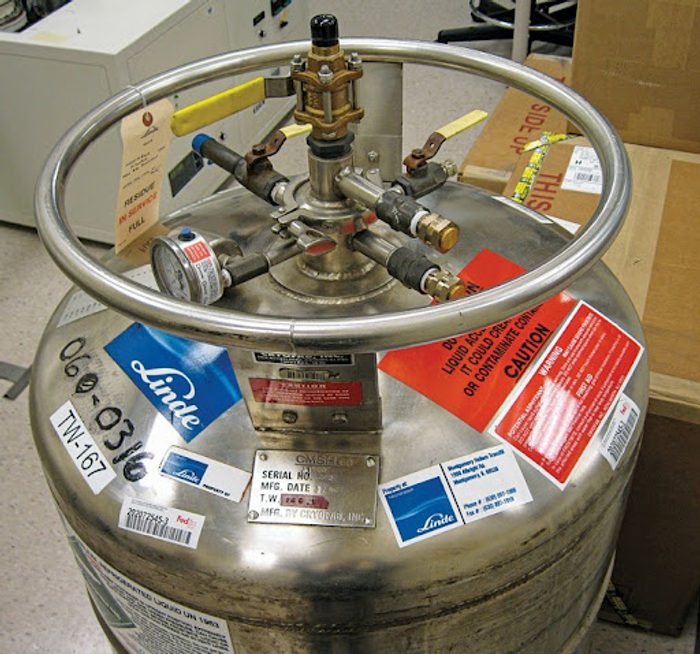Good morning, this is Kasmira and today we’re writing about Ukrainian children with cancer that have been evacuated out of the country to receive treatment here in Geneva and in other Swiss hospitals.
Meanwhile in the US, there are further rumblings of submitting a resolution to remove Russia from the Human Rights Council, this time among its senators.
And just a few metres away at the International Conference Centre Geneva, countries which have been gathered for the past three weeks didn’t make much progress towards a long-awaited agreement to protect nature. |

|

Ukrainian children in urgent need of cancer children arrive in Geneva on 18 March with their families. (Credit: Genève Aéroport)
|
|
🏥 An epic journey to Geneva for Ukrainian children with cancer.
A group of Ukrainian children have arrived in Geneva to undergo life-saving cancer treatment in hospitals around Switzerland. Thanks to a complex evacuation organised by Swiss NGO Zoe4Life, sixteen children aged between one and 14 landed at Geneva airport on 18 March. Thousands of Ukrainians have seen their treatment interrupted by the war, with supplies of medicines and critical equipment such as oxygen dwindling fast. A spokesperson for the WHO told journalists on Tuesday that only half the country’s pharmacies remained open and many of them did not have the necessary supplies. Since 24 February, there have been 74 attacks on healthcare facilities.
Geneva Solutions (EN)
|
|
🦥Slow progress on biodiversity talks.
Global negotiations for the protection of nature wrapped up on Tuesday evening with countries making little progress towards an agreement. Over 150 countries gathered in person in Geneva for the first time since the beginning of the pandemic for 15 days of meetings, but much to the frustration of some civil society observers, they struggled to reach a consensus on a number of issues and instead came up with new suggestions for the text. Countries have decided to meet again in Nairobi in June for another round of discussions just two months before the crucial biodiversity summit in Kunming, China.
Geneva Solutions (EN)
|
|
Here's what else is happening
|
|
Science and diplomacy reads by GESDA
|
|

A helium container. (Credit: Michael Pereckas/Wikimedia Commons)
|
|
Need a nuclear magnetic resonance (NMR) scanner?
You might need to wait for the end of the Ukraine-Russia war. Maybe this is exaggerated. But scientists are really starting to worry.
Liquid helium is used to cool the magnets that are used in NMR medical scanners, but also in many other science instruments. According to a C&EN article (see below), “helium is found alongside natural gas in conventional wells. In Algeria, at the site of Arzew, companies normally compress natural gas into liquid form for global transport by ship. During that process, it’s economical to extract helium because it liquefies at much higher pressures and lower temperatures than natural gas”. But now, the helium liquid production has stopped.
The reason? As a result of high natural gas demand in Europe, due in large part to Russia’s invasion of Ukraine, “much of Algeria’s natural gas is being sent to Spain via pipeline, making separation impractical. The industrial and rare-gas advisory firm Edelgas Group estimates that liquefied natural gas production in key regions is down 30 per cent from January, leading to a 10 per cent drop in global helium supply.” Helium users in several locations say they are struggling to get the gas they need to keep their scientific instruments running, according to the article, showing just how interconnected everything is in the worlds of science and geopolitics.
- Olivier Dessibourg, GESDA
(EN)
|

This selection is proposed by the Geneva Science and Diplomacy Anticipator
GESDA, working on
anticipating cutting-edge science and technological advances to develop innovative and inclusive
solutions for the
benefit of the planet and its inhabitants.
|
|
GS news is a new media project covering the world of international cooperation and development. Don’t hesitate to forward our newsletter!
Have a good day!
|

|
|
Avenue du Bouchet 2
1209 Genève
Suisse
|
|
|
| |










